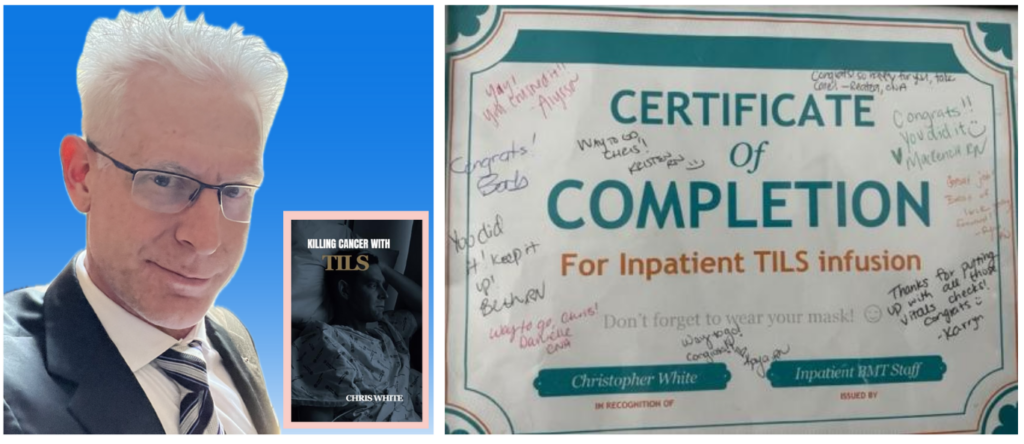
Chris White is a passionate advocate for cell therapies. He spends his time collaborating with patient advocacy groups, philanthropy organizations, and industry stakeholders focused on melanoma and cell therapy.
Diagnosed at 36 years old after discovering a lump in his groin, Chris underwent surgery and multiple treatments, including immunotherapy and chemotherapy. Despite aggressive treatment, his cancer progressed, leaving him with limited remaining options. One of these was to enroll in a clinical trial for an investigational TIL therapy, a type of cell therapy. As a result of his participation in the trial Chris has been cancer-free since early 2021.
During Friends webinar for advocates on May 23rd, Chris shared his story and noted his goal to inspire and educate more people on the potential of cell and gene therapies by sharing his personal story. We asked Chris to share additional perspectives through a Q&A. His answers reiterate why the patient perspective is so critical for advancing the field of cell and gene therapies.
Q1: In what ways do you believe cell and gene therapy have improved outcomes or quality of life for cancer patients?
CHRIS: They are less toxic with fewer side effects than traditional treatments. These are often one-time, curative therapies, where a patient can retain their quality of life, both short and long-term, without the burden of all the side effects and toxicities of traditional treatments. Patients are now being cured and eradicating their disease rather than fighting it long-term, causing further disruption in all aspects of life. Physical, emotional, financial, etc. In addition, people have more time with their loved ones and time is the most valuable thing on this planet.
Q2: Can you share any challenges or barriers you’ve encountered in advocating for broader access to cell and gene therapies?
CHRIS: These are still relatively new treatments, and most people don’t know that they exist or to ask about them. By the time [patients] learn about [cell and gene therapies], they have been heavily pre-treated by other therapies and no longer qualify and/or are physically unable to receive one. If they do qualify but don’t live near a major medical center of some sort, it becomes a roadblock and a barrier to pursuing cell and gene therapies. It’s extremely unfortunate because what is available and accessible is not always curative.
Telehealth and decentralizing clinical trials will greatly increase participation. In addition, insurance companies are having trouble approving these types of treatments for patients because they are still new, and they are not familiar with them. I’ve had oncologists from different parts of the country reach out to me saying that even with FDA approval they are having trouble getting their insured patients approved.
Q3: From your perspective, what do you see as the most promising advancements or areas of growth in the field of cell and gene therapy for cancer?
CHRIS: The cure for cancerand autoimmune diseases. People want to win the war not continue to fight the battles. They want an endgame when it comes to treatment not a Band-Aid. For example, with current statistics saying that 1 in 2 people will get some form of cancer in their lifetime and currently 90% of all cancers are solid tumors. The first FDA approved autologous cell therapy for metastatic melanoma is a TIL therapy and this type of cell therapy opens the door for [these therapies to be used for treatment of] other solid tumors like cervical cancer and lung cancer. With more approvals to come, there will be a larger patient population receiving these types of treatments. The quicker a person is assessed, diagnosed, and triaged, and the less toxic the treatments, the more they can retain their quality of life.
Q4: How do you believe patient advocacy can contribute to the design and execution of future cell therapy clinical trials?
CHRIS: Patient advocates, with lived experience like me are proofs of concept. We can give firsthand accounts of what worked and what didn’t work, what the side effects are like, the long-term physical, mental, and financial toll, etc. I believe more retention on future trials can be gained by adding the patient perspective to avoid past mistakes and prevent future ones. Cell and gene therapies are personalized treatments, not something that’s mass produced. Information about cell and gene therapies needs to be communicated in a simplistic way to help patients retain and understand more. For example, if you were developing a new car, you would have a test driver do a few laps around the track and then give their feedback right? Patient advocates are those test drivers. We are the data.
When I was fighting my disease all I wanted was to hear from another patient that had what I had and did the treatment that I was looking to do so I could see [an] example of what it was like. I didn’t want to hear from a drug rep or a Pharma company or a doctor. I wanted to hear from an actual person that had received it. People want authenticity.

